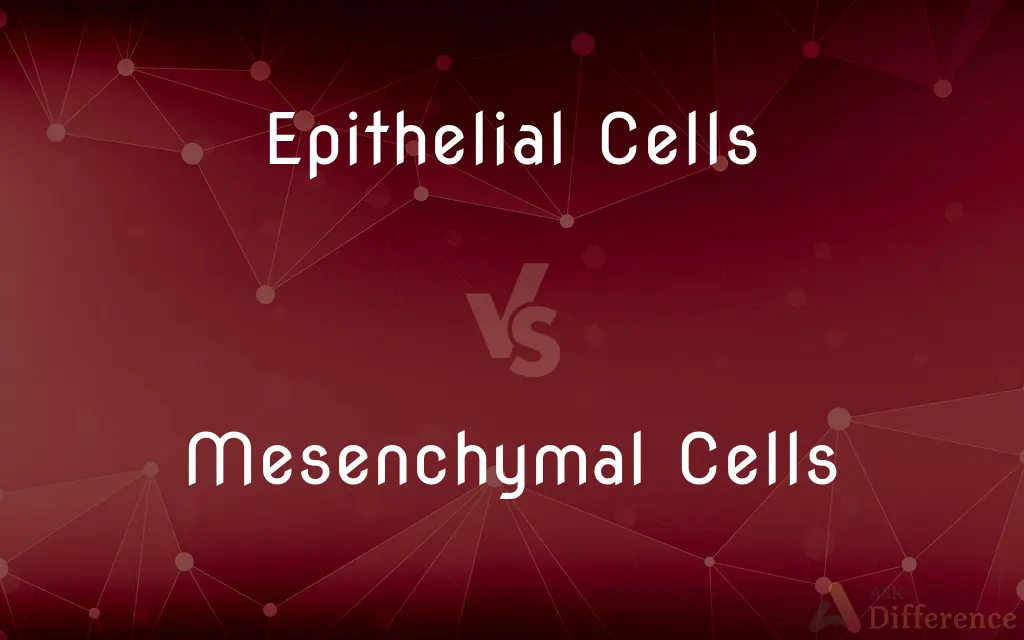Epithelial Cells vs. Mesenchymal Cells — What's the Difference?
Edited by Tayyaba Rehman — By Fiza Rafique — Published on December 28, 2023
Epithelial Cells form protective barriers and line body surfaces, while Mesenchymal Cells are undifferentiated cells involved in tissue repair and development.

Difference Between Epithelial Cells and Mesenchymal Cells
Table of Contents
ADVERTISEMENT
Key Differences
Epithelial Cells are a major cell type that line the surfaces of the body, including skin, organs, and blood vessels. They function as a barrier to protect the body and play roles in absorption, filtration, and secretion.
Mesenchymal Cells, on the other hand, are a type of multipotent stem cell. These cells can differentiate into a variety of cell types, including those that make up bones, cartilage, and fat. Their main role is in tissue repair, regeneration, and development.
Epithelial Cells typically exhibit a tightly packed and organized structure. They often have specialized junctions between them, ensuring that the layers they form are secure and act as effective barriers.
In contrast, Mesenchymal Cells display a more irregular and spread-out morphology. Their ability to migrate and change helps in processes like wound healing and tissue regeneration.
Both Epithelial Cells and Mesenchymal Cells play critical roles in the human body. While Epithelial Cells are essential for protection and performing specific functions on the body surfaces, Mesenchymal Cells are vital for repairing damaged tissues and facilitating growth.
ADVERTISEMENT
Comparison Chart
Function
Protection, absorption, filtration, and secretion.
Tissue repair, regeneration, and development.
Structure
Tightly packed and organized.
Irregular and spread-out.
Differentiation Ability
Limited to similar epithelial types.
Can differentiate into various cell types.
Role in Tissues
Line body surfaces and cavities.
Found within tissues, aiding in repair.
Morphology
Polygonal with specialized junctions.
Spindle-shaped, with capacity to migrate.
Compare with Definitions
Epithelial Cells
Cells with specialized junctions for tight packing.
The tight junctions between Epithelial Cells ensure the kidneys filter effectively.
Mesenchymal Cells
Multipotent stem cells in the body.
Mesenchymal Cells can differentiate into bone cells during fracture healing.
Epithelial Cells
Cells involved in absorption and secretion.
Epithelial Cells in the intestines help absorb nutrients.
Mesenchymal Cells
Cells that aid in tissue repair and regeneration.
After an injury, Mesenchymal Cells migrate to the site to aid repair.
Epithelial Cells
Cells that line body surfaces.
The skin is composed of Epithelial Cells that protect against external harm.
Mesenchymal Cells
Cells with a spindle-shaped morphology.
The unique shape of Mesenchymal Cells allows them to migrate efficiently.
Epithelial Cells
Polygonal cells that cover external and internal body linings.
The cornea's clarity is maintained by its Epithelial Cells.
Mesenchymal Cells
Cells capable of differentiating into multiple cell types.
Mesenchymal Cells can become fat, bone, or cartilage cells depending on the need.
Epithelial Cells
Barrier-forming cells in organs and tissues.
Epithelial Cells in the lungs prevent harmful particles from entering the body.
Mesenchymal Cells
Undifferentiated cells in the embryonic connective tissue.
Mesenchymal Cells play a vital role in fetal development.
Common Curiosities
How are Mesenchymal Cells distinct?
Mesenchymal Cells are multipotent stem cells involved in tissue repair, regeneration, and development.
Are Epithelial Cells vital for our survival?
Yes, they provide barriers against pathogens and help in various bodily functions.
What are Epithelial Cells?
Epithelial Cells are cells that line the surfaces of the body and play roles in protection, absorption, filtration, and secretion.
Do Epithelial Cells have the ability to differentiate like Mesenchymal Cells?
No, Epithelial Cells have limited differentiation ability compared to the multipotent Mesenchymal Cells.
Do Mesenchymal Cells have any role in immunity?
Yes, they have roles in modulating immune responses.
What is the significance of Mesenchymal Cells' morphology?
Their spindle shape and spread-out morphology allow them to migrate and participate in tissue repair.
Why are Mesenchymal Cells considered multipotent?
Because they can differentiate into various cell types like bone, cartilage, and fat cells.
Where can I typically find Epithelial Cells in the body?
They line body surfaces, organs, blood vessels, and cavities.
How do Epithelial Cells maintain their structural integrity?
They have specialized junctions that ensure they are tightly packed and organized.
Can Epithelial Cells regenerate?
Yes, they can regenerate, especially in areas like the skin which is frequently exposed to wear.
Can Mesenchymal Cells turn into Epithelial Cells?
Through a process called epithelial-mesenchymal transition, cells can adopt characteristics of the other type.
Do Epithelial Cells play a role in disease?
Yes, disruptions in Epithelial Cells can lead to diseases like cancer.
Are Mesenchymal Cells found in all tissues?
They are found in many tissues, especially those where repair and regeneration are frequently needed.
How are Mesenchymal Cells used in medicine?
Their regenerative properties make them candidates for therapies in tissue repair and regeneration.
What’s the primary role of Epithelial Cells in the lungs?
They form a barrier preventing harmful particles from entering the body.
Share Your Discovery
Previous Comparison
P Type Semiconductor vs. N Type Semiconductor
Next Comparison
Angular Velocity vs. Tangential VelocityAuthor Spotlight
Written by
Fiza RafiqueFiza Rafique is a skilled content writer at AskDifference.com, where she meticulously refines and enhances written pieces. Drawing from her vast editorial expertise, Fiza ensures clarity, accuracy, and precision in every article. Passionate about language, she continually seeks to elevate the quality of content for readers worldwide.
Edited by
Tayyaba RehmanTayyaba Rehman is a distinguished writer, currently serving as a primary contributor to askdifference.com. As a researcher in semantics and etymology, Tayyaba's passion for the complexity of languages and their distinctions has found a perfect home on the platform. Tayyaba delves into the intricacies of language, distinguishing between commonly confused words and phrases, thereby providing clarity for readers worldwide.















































